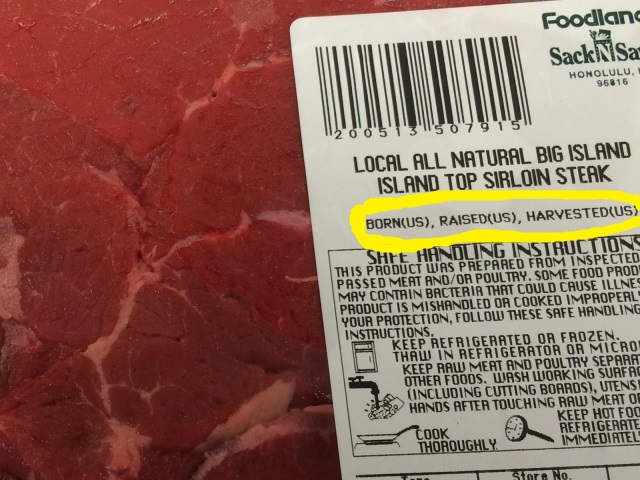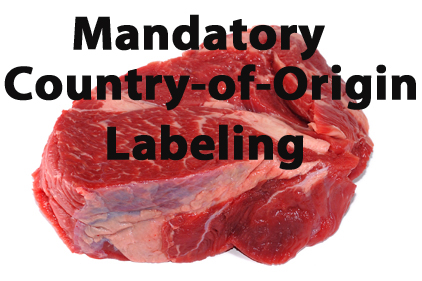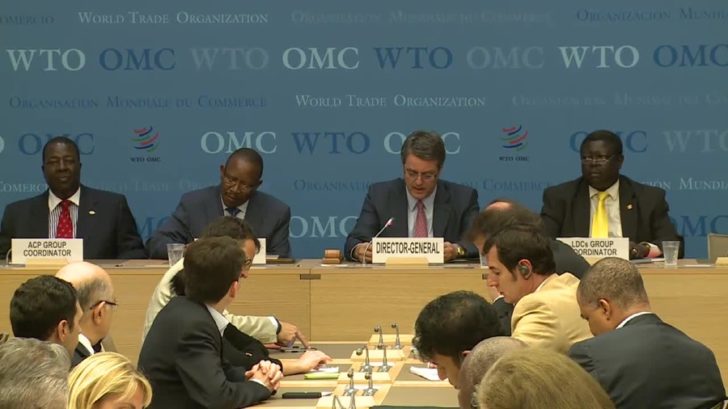Joe For America: How America Lost Its COOL!
By The Cavalry Group on April 15, 2017
A trip to the produce and meat sections of your local grocery store will yield product labels from a dizzying number of foreign countries. Farm-raised Tilapia from China, shrimp from Taiwan, blue berries from Chile, lamb from New Zealand, strawberries from Mexico, wild-caught Halibut from Canada, and chicken from the United States of America.
Only recently was your grocer required to affix those consumer-friendly labels that identify the origins of certain food products. It was even more recently that those seemingly innocuous labels ignited a firestorm in Congress, ultimately bringing that institution to its virtual knees.
In a case of faltering loyalties, Congress ignored the wishes of its constituents and the judicial rulings from our U.S. courts and hastily voted to strip U.S. consumers of their basic right to know, “Where’s the beef” from? In December 2015, Congress and then President Obama repealed the nation’s widely popular country of origin labeling (COOL) law that required retailers to inform consumers about the origins of their beef and pork.

It did this for no other reason than to appease the un-appealable whim of an unelected, unappointed and conflicted panel of foreigners convened in Geneva, Switzerland, by the World Trade Organization (WTO).
Thanks, then, to this WTO – Congress’ newly anointed supreme authority – consumers can continue to know which countries grew their fish and shellfish, fruits and vegetables, certain nuts and lamb, venison and chicken, but they lost their fundamental right to know where the animals that produced their beef and pork were born, raised and harvested.
So what terrible infraction did U.S. consumers commit to cause them to lose their basic right to know under what countries’ food safety system their beef and pork were produced?
The infraction was citizen apathy – we simply took our eyes off the ball for a moment too long.
Two decades ago we stood silent as Congress began revering a new authority known as globalization, which was replete with global standardization, global governance, and a policing unit known as the WTO. This new authority transcended our cherished Constitution.
This globalization authority demanded the U.S. relax food safety standards to allow the importation of more beef and other food products into the U.S. from developing countries that could not or would not maintain food safety systems at least equal to those in the United States. This relaxation did, indeed, facilitate more food imports. By 2012, for example, the U.S. Department of Agriculture (USDA) estimated that 18 percent of the beef available in the domestic market was imported and those imports were trending upward. The U.S. now imports beef from over 20 countries, including from Brazil, Uruguay, Mexico, Nicaragua, Costa Rico and Honduras, where food safety infrastructures are as likely as not to be wanting.

In the face of rising imports, farmers, ranchers and consumers went to Congress and helped pass the mandatory COOL (country of origin labeling) law at the turn of the century. The COOL law was intended to empower consumers to express their nationalism by choosing to support beef and other foods exclusively produced in the United States, purchase beef and other foods produced under whichever country’s food safety regime the consumer chooses, and confine the impacts of a disease outbreak to only the source-country affected by the outbreak, rather than to the entire domestic supply of a particular food such as beef.
But, there is only so much power to be wielded within our food supply chain. Empowering one segment (consumers) necessitates reducing power from another (packers, processors and retailers). This fact did not escape the well-connected multinational beef packers and their politically powerful allies in Congress.
This explains why COOL for beef and pork was not properly implanted until 11 years after the law was passed. The meatpackers, along with their allies in Congress and the USDA delayed COOL for as long as they could.
Congress and the meatpackers knew they were defying the wishes of their constituents and customers, respectively, as poll after poll demonstrated overwhelmingly public support for COOL. A poll by the reputable Consumer Reports National Research Center, for example, found that 93 percent of consumer would prefer to have a country of origin label on the meat that they buy.
Nevertheless, before the ink could dry on the COOL law’s implementing regulations in 2013, the meatpackers and their allied producer groups from the U.S., Canada and Mexico filed a lawsuit in federal court against COOL. They alleged it was unconstitutional for Congress to require meatpackers to inform consumers as to the origins of the beef and pork the meatpackers were importing from a host of foreign countries.

The meatpackers did not like the district court’s 80-page ruling that solidly upheld the constitutionality and lawfulness of mandatory COOL. They appealed both to a three-judge appellate panel and then to the appellate court’s entire 11-judge panel. Consumers won each of those cases and our U.S. judicial system had decisively and unequivocally upheld mandatory COOL for beef and pork.
In our nation of laws, one would expect our judicial branch of government to have the final say.
However, the meatpackers knew, as did the governments of Canada and Mexico, that Congress had unwittingly anointed an even higher authority than our constitutionally established court system. The governments of Canada and Mexico, aided by U.S. meatpackers and their allies, intensified their attack against the U.S. COOL law in the Geneva-based World Trade Organization.
Unlike in our constitutionally-established court system located in Washington, D.C. the meatpackers and their foreign allies found a sympathetic ear across the Atlantic. The WTO was so sympathetic to the anti-COOL delegation’s cause that it appointed a Mexican national to chair the three-member WTO panel that ultimately decided the case that Mexico and Canada had brought against COOL. That is right: the WTO appointed a representative from one of the two countries that filed the WTO complaint against the U.S. COOL law to decide the fate of the COOL law.
The mind of a gambler was not needed to predict the WTO’s outcome.
When Congress learned that the hallowed WTO had spoken, it couldn’t act fast enough to appease the WTO and kowtow to the multinational meatpackers and the governments of Canada and Mexico by repealing the widely popular COOL law for beef and pork. Congress completely ignored the strong consumer support for COOL and the multiple U.S. judicial decisions that had decisively upheld America’s law.

And that is how America lost its COOL for beef and pork.
The Ranchers-Cattlemen Action Legal Fund, United Stockgrowers of America (R-CALF USA) has launched a new campaign to reinstate the consumer-friendly COOL law for beef and pork. Named “COOLin100,” the campaign uses social media to urge President Trump to reinstate COOL for beef and pork during his first 100 days in office. To help with this effort, please:
-
1. Share the following message with the White House (https://www.whitehouse.gov/contact#page): “We need mandatory Country of Origin Labeling reinstated on our beef and pork in the first 100 days of President Trump’s Administration.”
2. Tweet the message to President Trump (@realDonaldTrump)
3. The hashtags that R-CALF USA is using to promote our new COOL Campaign are the following: #COOLin100 #DemandUSABeef #LabelOurBeef #FoodSafety
4. If you are not following us on Twitter, please do so! Our Twitter handle is @RCALFUSA
5. Donate to the cause: Text COOL10 to 4066305536 to donate $10 to support COOL; or replace the 10 with any dollar amount you wish to give. Donate through our website. Or mail-in your contribution to R-CALF USA, COOLin100, PO Box 30715, Billings, MT 59107.
Bill Bullard, a guest writer for The Cavalry Group, and the CEO of R-CALF USA, the largest national membership-based association that exclusively represents the interests of U.S. farmers and ranchers who raise and sell cattle within the multi-segmented beef supply chain.